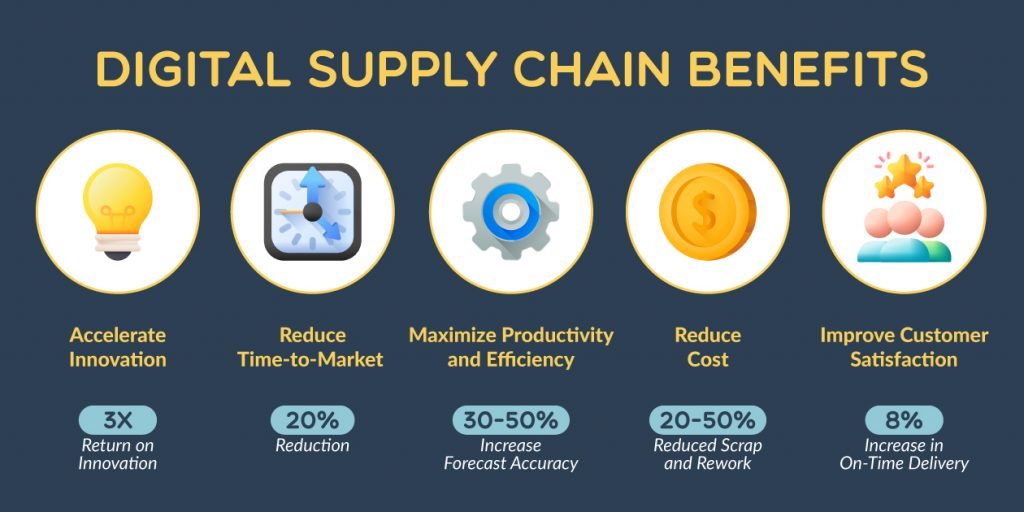Everything is going digital, and it has been a long time coming. From digital commerce, procurement, and various business operations can be done digitally through the advancing technologies we have at our disposal. Just like any other industry, supply chain management has transformed into the digital landscape. Digital supply chain management is now an emerging business trend that comes with the popularity of digital commerce. In this article, we will discuss what digital supply chain management is, what it can offer for your business, its risks, and how your business can digitize your supply chain management.

Definition of Digital Supply Chain Management
Digital supply chain management is a combination of traditional supply chain management with the use of digital technology and data analytics to help improve and optimize efficiency, visibility, and coordination of supply chain activities. Digital supply chain management includes the use of various technologies such as cloud computing, artificial intelligence (AI), Internet of Things (IoT), and data analytics to streamline and optimize the process of supply chain management.
In short, digital supply chain management doesn’t stray far from traditional supply chain management. It only digitizes the physicality of supply chain management which makes the process of it easier, faster, and more efficient.
What Digital Supply Chain Management Can Do for your Business
Now that we’ve discussed the definition of digital supply chain management, we will delve into how it can streamline your supply chain management.
- Data-driven decision making
With technology at your fingertips, your business can make better decisions with the help of data and analytics functions. Digital supply chain management enables businesses to collect and analyze vast amounts of data from various sources within the supply chain. This data includes information about sales, production, inventory, logistics, and customer behavior. By leveraging advanced analytics techniques, businesses can gain valuable insights into their operations, such as identifying trends, patterns, and correlations.
- Inventory forecasting
With the capabilities of digital analytics capabilities, your business can improve the accuracy of inventory forecasting. This enables businesses to optimize inventory levels, production schedules, and procurement decisions, minimizing the risk of stockouts or excess inventory. How? Through sales data history, combined with external factors such as market trends, promotions, and economic indicators, can be analyzed to generate more precise forecasts.
- Streamline inventory optimization
Digital supply chain management offers businesses the ability to streamline inventory optimization by leveraging data analytics and technology. Through real-time data and advanced analytics, businesses can precisely set delivery times, reduce excess inventory, lower carrying costs, and improve supply management efficiency. By utilizing inventory optimization models, businesses can identify optimal stock levels, streamline reordering, and implement strategies to minimize inventory holding costs while maintaining adequate stock levels.
- Real-time supply chain management
The technologies of digital supply chain management enables businesses to view real-time data which allows them to make quick on-the-spot decisions and adapt to real-time data trends. Through the use of advanced technologies like barcodes and cloud-based platforms, businesses can track and monitor inventory levels, production processes, shipments, and other critical data points in real-time. This visibility allows businesses to have an up-to-date understanding of their supply chain status, identify potential bottlenecks or disruptions, and make informed decisions promptly.
- Track and define KPIs
Digital supply chain management allows businesses to track and define KPIs that align with their supply chain objectives. KPIs metrics includes data such as on-time delivery, order fulfillment cycle time, inventory turnover, perfect order rate, and supplier performance. By monitoring these KPIs in real-time, businesses can assess their performance, identify areas for improvement, and make data-driven decisions to enhance supply chain efficiency and customer satisfaction.
- Customer centricity
Digital supply chain management facilitates the implementation of personalized and customized offerings. By analyzing customer data, businesses can gain insights into individual preferences, purchase history, and product personalization. This allows businesses to tailor products, packaging, and services to meet specific customer requirements. Another benefit that digital supply chain management provides is faster deliveries, real-time order tracking, and superior customer service, enhancing customer convenience and satisfaction.
The Risks of Digital Supply Chain Management
- Disruption of Network Infrastructure
Digital supply chain management heavily relies on network infrastructure from third-party service providers. These network infrastructure includes communication channels, servers, and data centers. Hence, these network infrastructures are vulnerable to DDoS attacks. Disruptions in network connectivity can hinder the flow of data and information, leading to delays, downtime, or inaccuracies in supply chain operations.
- Disclosure of customer’s sensitive data & information
In a digital environment, it involves the processing of customer information and data across the platform, to stakeholders, vendors, and suppliers. From one transaction to another, customer data is being transmitted on the digital platform. Cybercriminals may attempt to breach the system’s security and data integrity to gain unauthorized access to sensitive customer information. This may include financial details, personal information, or intellectual property.
A B2B eCommerce platform in the Philippines, Shoppable Business, adheres to data privacy laws and regulations to keep its buyers and sellers and has a robust security system in its marketplace that solidifies and protect its data from cyberattacks.
- Risk of Non-compliance
Digital supply chains involve the exchange of data and information across multiple parties, both internally and externally. The complex flow of data increases the risk of mishandling, leading to non-compliance with data privacy and security regulations. The regulatory landscape surrounding digital technologies and data management is constantly evolving. New laws and regulations are being introduced to address emerging challenges and protect individuals’ rights. Organizations may struggle to keep up with these changes and may inadvertently violate new or updated requirements.
Digital Supply Chain Management and eCommerce

Ecommerce and digital supply chain management are closely related to each other. Leveraging the use of eCommerce technology is essential in digital supply chain management.
- Seamless Order Processing
Digital supply chain management enables smooth and efficient order processing in e-commerce. From the moment a customer places an order on an e-commerce platform, the digital supply chain comes into action. Automated systems manage order fulfillment, inventory management, and shipping processes, ensuring timely and accurate order processing.
- Inventory Visibility and Control
Digital supply chain management provides real-time visibility into inventory levels across multiple locations and channels. This visibility is crucial for e-commerce operations as it enables accurate stock management, prevents overselling, and ensures that customers have access to up-to-date information about product availability.
- Efficient Fulfillment
E-commerce relies on efficient and timely order fulfillment. Digital supply chain management facilitates automation and optimization of fulfillment processes, including picking, packing, and shipping. By integrating order management systems, warehouse management systems, and transportation systems, organizations can streamline fulfillment operations, reduce errors, and improve order accuracy and speed.
A particular B2B eCommerce marketplace in the Philippines, Shoppable Business, promotes the digitization of businesses in the Philippines through its comprehensive dashboard and single product catalog listing for vendors and buyers in its marketplace. From procurement, digital supply chain management, buying, selling, and wholesaling, your business can perform various business functions digitally.
On another note, Shoppable Business champions responsible entrepreneurship that ensures that your business stays compliant with tax and regulatory requirements by issuing digital invoices and BIR form 2307 for businesses that need it.









